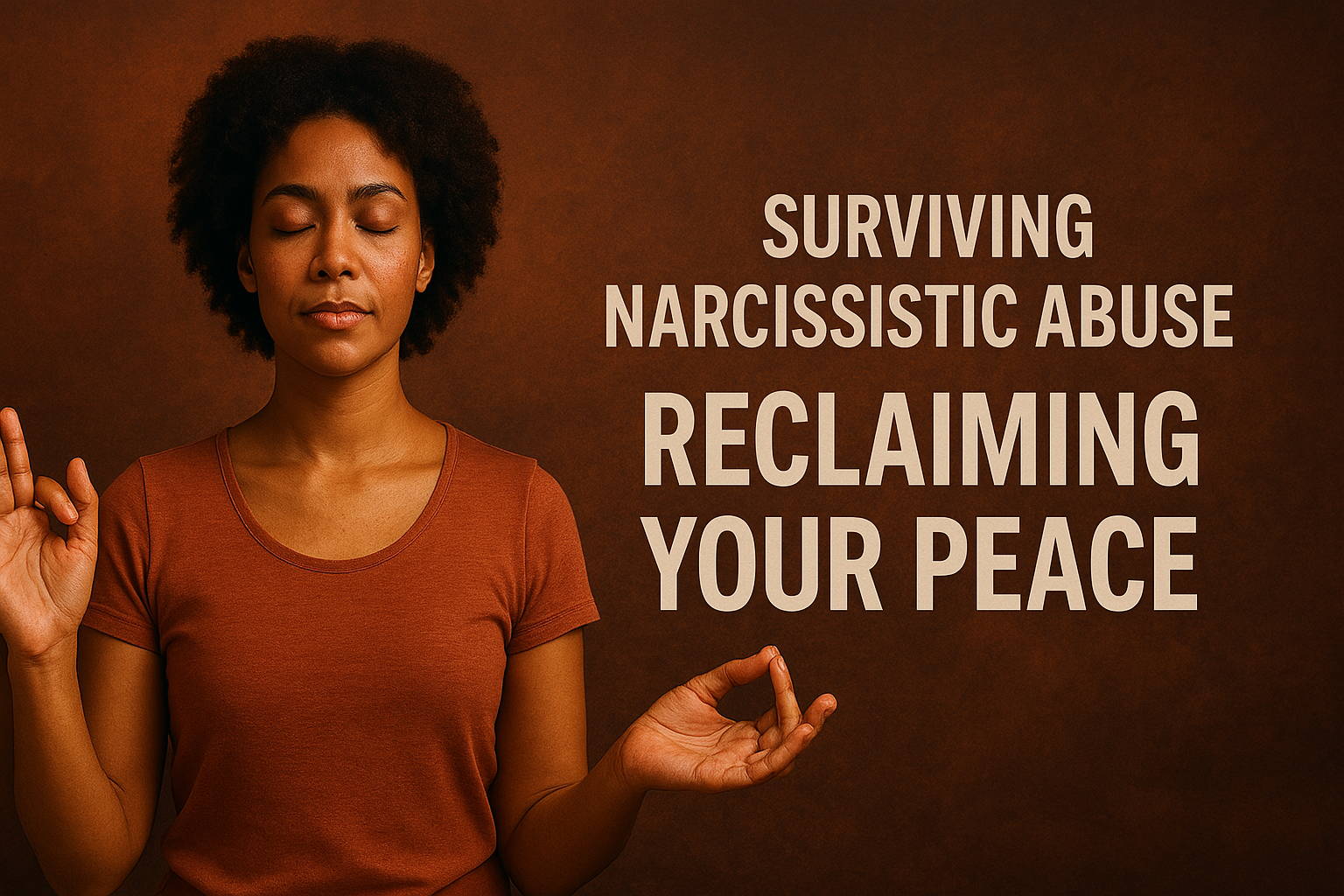
Understanding Narcissistic Abuse and How to Recover from It
Narcissistic abuse is a form of emotional, psychological, or even physical abuse inflicted by someone with narcissistic traits or Narcissistic Personality Disorder (NPD). This type of abuse can be deeply damaging, leaving victims feeling confused, isolated, and unsure of their own reality. Recovery is possible, but it requires time, self-compassion, and the right support.
Understanding Narcissistic Abuse
Narcissistic abuse is a form of emotional manipulation perpetrated by individuals exhibiting narcissistic traits—such as a grandiose sense of self-importance, a lack of empathy, and a constant need for admiration. This abuse often involves psychological and emotional tactics designed to undermine a victim’s sense of self-worth, reality, and well-being. Narcissistic abusers typically establish control over their victims by systematically chipping away at their self-confidence and forcing them to question their own perspective.
Below are some common manipulation tactics used by narcissistic abusers, along with examples that illustrate how they play out in real-life scenarios.
1. Love Bombing
What It Is
Early in relationships—or sometimes after conflict—narcissists may shower the victim with affection, attention, gifts, or flattery. They create an intense sense of closeness and emotional connection quickly, which can feel intoxicating and romantic.
Example:
Rapid Intensification: John meets Sarah and immediately declares she’s “perfect” and he’s never felt so connected. Within days, he’s talking about a future together, buying lavish gifts, and bombarding her with texts expressing his love. She feels flattered and special, letting her guard down. But soon, he begins to assert control in subtle ways, claiming her time and attention with demands cloaked in “love.”
2. Gaslighting
What It Is
Gaslighting is a psychological tactic in which the abuser denies reality or twists facts to the point where the victim questions their own memory or sanity.
Examples:
Blatant Denial: Emma notices her partner, Mark, lying about meeting up with someone else. When she confronts him with evidence (like messages), he dismisses her proof and calls her “delusional.” He might say, “That never happened” or “You’re imagining things,” leaving Emma confused and wondering if she’s overreacting or misreading the situation.
Shifting the Blame: If Emma becomes upset, Mark might say, “You’re the one who’s always paranoid,” thus flipping the script to make her feel at fault for suspecting him.
3. Triangulation
What It Is
Triangulation involves an abuser bringing in a third party—an ex-partner, a friend, or even a family member—to create jealousy, rivalry, or divide. By pitting people against each other, the narcissist maintains control and attention.
Example: Comparisons and Rivalries: Aaron consistently tells his current partner, Tracy, how his ex-girlfriend was more understanding or more attractive. Over time, Tracy feels inadequate and competes for Aaron’s approval. This dynamic keeps her off-balance and eager to please him so she won’t “lose” him as she imagines she might if she doesn’t measure up.
4. Intermittent Reinforcement
What It Is
A cycle of positive reinforcement (affection, compliments, promises of love) followed by negative treatment (criticism, coldness, or withdrawal) keeps the victim longing for the “good times” and trying to earn back the abuser’s approval.
Example:
Hot-and-Cold Behavior: After a fight, a narcissistic abuser might give the silent treatment or harshly criticize the victim, only to suddenly switch back to compliments and flowers a few days later. The victim feels relief and hope that the “nice version” of the abuser is back. This unpredictable cycle creates a powerful emotional bond, making it harder to leave.
5. Silent Treatment and Stonewalling
What It Is
Abusers may respond to conflict or perceived slights by completely ignoring the victim or refusing to communicate. This tactic is used to punish, maintain power, and make the victim desperate for re-engagement.
Example:
Sudden Withdrawal: After a minor argument, Nina’s partner, Luke, goes days without speaking to her, refusing to acknowledge her presence. When she tries to initiate a conversation or apologize, he just shrugs or walks away. Nina becomes increasingly anxious, feeling she’s done something terribly wrong, and will do almost anything to regain Luke’s attention.
6. Smear Campaigns
What It Is
When a victim stands up to the abuser or tries to leave, the narcissist might spread rumors or lies about the victim to friends, family, and colleagues, portraying themselves as the real victim.
Example:
Rewriting the Narrative: Liz decides she’s had enough of her boyfriend, Carlos’s manipulation. She breaks up with him. Carlos then contacts their mutual friends, claiming Liz was “unstable” and “abusive.” He strategically twists events, so that by the time Liz seeks support, many are already influenced by Carlos’s version of the story.
7. Financial Control
What It Is
Some narcissists use financial manipulation—restricting the victim’s access to money or creating a sense of dependency—to keep the victim trapped or indebted.
Example:
Allowance and Limitations: Max insists his wife, Lea, quit her job to become fully dependent on him. He then controls all the bank accounts, monitors her spending, and scolds her for any unapproved purchase. Lea feels she has no financial freedom or ability to leave, strengthening Max’s grip on her decisions.
8. Blaming and Projection
What It Is
Projection occurs when the narcissist attributes their own feelings or actions to the victim. They often blame the victim for any negative situation or conflict—even when it’s clearly the abuser’s fault.
Examples:
Accusing the Victim: A narcissistic partner who is being unfaithful may constantly accuse their partner of cheating or flirting. They shift the focus away from their own wrongdoing, making the victim feel defensive and distracted from the real problem.
Personal Failures: If the abuser loses a job or has a personal setback, they might insist it was the victim’s negative influence—e.g., “I can’t focus because you stress me out. This is your fault.”
Protecting Yourself and Seeking Help
1.Recognize the Patterns: Understanding common manipulation tactics can clarify that the abuser’s behavior stems from their own needs for power and control, rather than your shortcomings.
2.Document Interactions: Keep notes or records of incidents (texts, emails, dates of arguments). This evidence can help you trust your own recollection when gaslighting occurs—and may be useful if you seek legal or professional help.
3.Set Boundaries: Consistently and firmly enforce personal boundaries. If it’s safe, practice calmly stating how you expect to be treated and following through when limits are violated.
4.Seek Support: Talk to close friends, family, or a therapist. Professional counseling can offer coping strategies and validation to counteract the abuser’s manipulations.
5.Safety Plan: If you feel physically or emotionally unsafe, create a plan for leaving. Contact a support line or local shelter for guidance if you fear retaliation.
The Impact of Narcissistic Abuse
The effects of narcissistic abuse can be long-lasting and far-reaching. Victims often experience:
•Low self-esteem: Feeling unworthy or incapable due to constant criticism.
•Confusion and self-doubt: Struggling to trust their own thoughts and feelings.
•Emotional exhaustion: Dealing with cycles of manipulation and conflict.
•PTSD or C-PTSD: Developing symptoms like hypervigilance, flashbacks, or emotional numbness.
Understanding that these effects are not your fault is an essential step toward recovery.

How to Recover from Narcissistic Abuse
Recovery is a journey of rediscovering your sense of self, rebuilding confidence, and learning to trust again. Here are some key steps:
1. Acknowledge the Abuse
•Recognize that the behavior you experienced was abusive, and you are not to blame.
•Educate yourself about narcissistic abuse to understand the dynamics and patterns.
2. Set Boundaries
•Establish clear limits to protect your mental and emotional well-being.
•If possible, consider limiting or cutting off contact with the abuser (no-contact or low-contact).
3. Seek Support
•Lean on trusted friends, family, or support groups for validation and encouragement.
•Consider therapy with a professional experienced in trauma and narcissistic abuse recovery.
4. Reconnect with Yourself
•Practice self-care to nurture your emotional and physical health.
•Engage in activities that bring you joy and help you rediscover your identity outside the relationship.
5. Challenge Cognitive Distortions
•Work on identifying and reframing negative beliefs instilled by the abuse.
•Therapy techniques like Cognitive Behavioral Therapy (CBT) can help rebuild self-esteem.
6. Be Patient with the Healing Process
•Healing is not linear and may involve setbacks. Celebrate small victories along the way.
•Practice self-compassion and avoid blaming yourself for the abuse or its effects.
Why Professional Help is Important
Recovering from narcissistic abuse can be challenging, as it often involves unlearning deeply ingrained patterns of self-doubt and emotional dependence. A therapist can provide tools for processing trauma, improving emotional regulation, and rebuilding a healthy sense of self-worth. Therapy modalities like EMDR, CBT, and DBT are especially effective in addressing the emotional wounds caused by narcissistic abuse.
Narcissistic abuse can leave lasting scars, but it does not define you!
With time, effort, and support, you can reclaim your identity, rebuild your confidence, and create a life free from manipulation and control. Remember, healing is possible, and you deserve relationships that are rooted in mutual respect, love, and trust.
If you or someone you know is dealing with narcissistic abuse, reaching out for help is a powerful first step toward recovery.
